--------------------------------------------------
In the last month of this year, 2019: I find myself again involved in a workshop with a group of women. For the past two months along with two other women I have been co-facilitating a writing workshop under the title: "The Taste of Letters". The name of the workshop was taken from a line in talk given by the poet Iman Mersal in the Sharjah Biennial. In it she talks about the relationship between food and language, reflecting on alphabet soup among other things. This soup is composed of pasta pieces shaped in the letters of the English language. She wonders what the Arabic letters would taste like, if a similar soup were available in Arabic letters.
The workshop came about during my work as a researcher/curator with the Contemporary Image Collective on a project titled “Botoun” which means bellies, in Arabic, and is concerned with the politics and practices of food production, distribution and consumption. During the research phase of the project we had a very difficult time locating texts that spoke to the topic at hand from the perspective of women from the region, and especially texts written in Arabic.
While working to produce a workshop that produces texts on food, I have largely been unable to feed myself- the irony of this is not lost on me. My flatmates who are also my best friends have largely taken over this mission. They buy the fresh greens from the market- spinach and arugula are now in season. They wash them carefully, soaking them in vinegar and water first to remove any possible other life forms. Then they pat them dry, and place them in boxes, layering them with tissue paper to lengthen their freshness. They buy sweet potatoes, and parsley making them into deliciously flavored orange chewy mush. I ask them to get me aubergines, and courgettes; planning to make them, then I forget them and they rot in solitude in the dark corners of our fridge. I wonder if it’s because of the workshop, because in consuming so many texts about food, I’m too full to think about actually cooking or eating or any activity which takes place in the kitchen.
For most of the year a dear friend of ours has been engaged in battle with the disease which grows and grows inside. The growth has consumed her belly with pain. With so much pain that I cannot begin to understand or describe. But this too maybe sometimes left me feeling full. The fullness of helplessness; of wanting to feed her but not wanting to cause her more pain, the fullness of watching the pain grow inside her, while she grew thinner and thinner.
A couple of weeks before friends and colleagues were detained in their office, exits sealed, phones confiscated because one of them had written something that angered the men in suits. (More about this you can read here.) In the middle of this crisis of being unable to reach any of our friends we sat down and ordered hamburgers and fries. The hunger of helplessness. The hunger that is actually anger with nowhere to go. Miraculously they were all released at which point I dropped my burger. Suddenly full, and my heart rate ran up.
I went and visited her shortly after this crisis: she had told me had been craving strawberry donuts. That was to be our last meal together : bananas, strawberry- donuts, and tiny roasted chickpeas- the kind that are commonly given to attendees at “Sebou’”- a ritual of celebration for a newborn child on the seventh day after their birth, this ritual has persisted in this land for hundreds if not thousands of years. Six days later she left this world.
The workshop is still ongoing it’s scheduled to end on the 21st of December. Ever since she left I have been hungry. Ravenous, even. On most days, I still have trouble feeding myself, and despite my hunger I am finding most things to be tasteless.
--------------------------------------------------
On the last weekend in October I had been invited to a wedding in my hometown of Alexandria planned to take place outdoors. Usually this would be the perfect time to have an outdoor wedding in Alexandria, as the summer heat fades away and before the arrival of the first "Nawa", a heavy wind which disturbs the seas and precipitates rainfall throughout the winter months up till spring, the first "Nawa" is called "Ghaseel El Ballah", which means the washing of the dates, as it arrives just as the dates are ripening.
The wedding was that of a close friend's sister; the entire family had been planning it for months. I have an extremely troubled relationship with weddings in general, but I was trying to be supportive for my friend’s sake. Since she was on the planning committee for her sister’s wedding I had been hearing about the preparations for months. The couple had consulted the calendar of "Nawas" before planning their wedding and had decided to hold it on that particular weekend, Friday the 25th of October to avoid the rain which had been expected to arrive on Friday the 18th. It never did arrive on the 18th, which was an exceptionally hot day by October standards. On Tuesday the first drops of rain fell against my head on my way to work in Cairo. The droplets soon turned into showers that blocked the (let's be honest probably shitty) sewage system in parts of Cairo causing some deaths by electrocution as some streets were completely flooded.
My friend and her family started to panic, and began to consult the forecast obsessively in the leadup to the weekend praying for it not to rain. On Friday morning I took a bus to Alexandria, the weather in Cairo seemed decent enough but my friend called me when I was halfway to Alexandria to tell me the sky was brimming with huge grey clouds. The closer we got to Alexandria the more overladen the clouds till eventually we entered rain zone. My father picked me up from the stop as he had offered to drive me to the rented villa where the wedding was supposed to be held. The car started floating a bit as the road became more and more flooded, but we drove slowly along guided by the GPS, we entered an area with muddy unpaved roads and large lavish villas then lost reception. Feeling a bit worried that we would get stuck in the mud we drove back to the reception zone, where my friend finally managed to get a hold of me to tell me the wedding had been moved indoors as the garden area had been completely flooded. We drove back as we had come to the new venue and found that the power had been cut off as the government probably fearing further accidents had cut off power in the entire area. The DJ along with his car had gotten stuck in the mud on their way from the original venue. The bride was halfway through getting her hair done when the power went out. And an emergency power generator had been ordered but was still getting charged somewhere. Meanwhile the guests had started to stream in and the hall was suddenly full of guests, including older grandmothers, kids and a little golden retriever pup in a skirt. It was about 3 pm when the sky darkened then lightning, thunder and pelting winds created a backdrop for the assortment of creatures crammed in the impromptu wedding hall. By this time my friend, the bride’s sister arrived apologizing to everyone and half in tears: "Everything that could have went wrong did." In the end, the bride got her hair half done, the wedding ceremony was conducted by the Ma'zoun – a person legally authorized to conclude Muslim marriages and divorces – to the light of smartphones, as he couldn't wait for the generator to arrive, and the DJ was rescued from the mud in time to play a few tunes.
We, the friends and family did manage to get the bride to lighten up after her party which had cost thousands of pounds got ruined by what the Washington Post referred to as a "Medicane", (an analog to a hurricane previously rare in the Mediterrenean but becoming increasingly likely due to rising water temperatures) but which the Egyptian forecast authority downplayed saying it was a common occurrence that they affectionately refer to as "Hamada" – a common nickname for boys named Mohamed. "Medicane" or "Hamada", I don't know, but Alexandria along with the entire delta region is projected to drown in 30 years. My father and I contemplated this in the car between the two venues, he mused that it certainly wouldn't be the first time. Is this city a victim of geography, of fate? Or of corruption, greed, extinction capitalism? The bride's aunt joked that the "Nawa" should be renamed after her, but it seems to me that the very fabric of time seems to be falling apart as seasons that farmers and seafarers have known for centuries are becoming defunct.
--------------------------------------------------
"Hamada is a whale father, Hamada is a whale, father", the wail repeats itself, "Hamada is a whale, father", the singer Ibrahim X is enveloped by the attendees, as Younes (Arabic for Jonathan, as mentioned in the Qur’an) pressed frantically on his midi controller, sending waves of melodic notes melting the bodies into one moving mass. Standing in a corner, observing the crowd I felt immersed in a prayer. The song, which you can listen to here, the repeated reference to the whale throughout the song brings to mind the image of being swallowed perhaps by life or by the means one uses to escape it.
The room was brimming with people, mostly aged 18 to 30, male and female, foreigners and Egyptians all dancing to the music. It's the second type of event of this sort to be organized by Hizz, a Cairo and Detroit based record label, artists residency and record store with the aim of promoting avant garde art and music in the Middle East and diaspora. Their space in Cairo is housed in an apartment in Garden City. The event titled "Open House Saturdays", is free and showcases up and coming artists in the scene along with more established names. One of the main problems of the music scene is the lack of venues that are willing to host small scale live music events, so while digital platforms like Soundcloud, Bandcamp and Youtube have allowed artists to reach more listeners, artists have much less opportunities to interact with each other and with listeners in a live setting or to actually make money from their art, which affects the sustainability of the scene and its ability to develop. It was my second time attending one of Younes and Ibrahim X's performances in Cairo; they are both artists with Kafr Al Dawar recordings, an independent digital record label based in Kafr El-Dauwar, Al-Buhayra, Egypt, where both of the artists are from. The label aims to provide a platform for emerging artists for cross pollination between different genres like electronic, dance, experimental and shaabi.
So there I was in a crowded room in an apartment overlooking the Nile on the Saturday preceding "Eid El Adha". Inwardly my blood flowed silently into my pants, my period had arrived early, a premonition perhaps of the blood that was to be spilled on the streets, on the dawn of "Eid Al Adha". "Eid" is Arabic for feast or celebration, and "Adha" comes from the root "Daha" which means a sacrifice, as the faithful offer a sacrificial animal, the meat of which is distributed among family members, and the poor.
After the party I invited my friend S, to spend the night at my place as she did not want to spend the night alone at her own place as both her flat mates were away for the Eid break. We left my place the following day to walk to hers and check on her cats. Before leaving the house, we had breakfast: spinach and mushrooms on a bed of beetroot hummus nestled between bread, the beetroot making the hummus into red, a bright blood red. The streets were almost completely empty, save for one kiosk from which we purchased cigarettes and a bottle of cold water to parch our dry mouths. There wasn't any visible sign of blood on the streets, just a faint odor haunting the air like a ghost. "The Eid Effect" was in full swing, in most Muslim homes, the sacrificial animal is killed at dawn after which people eat, then sleep, probably till it's time to eat again. The sun beat down relentlessly on the empty pavements, we managed to find a cab at last, an old smiley man who we wished Happy Eid, as we left the cab to climb the stairs to my friend's flat.
My friend is Muslim on her ID card, and I am Christian on mine. Religion is a big deal in Egypt, but sometimes it also isn't. The way it occupies space, how much space it occupies and in what form is always shifting, things stay the same but they don't. We shutter the windows in the house to protect us from the heat, and play with her two cats, in between smoking, drinking tea, and then drinking coffee. My birthday was at the beginning of August and hers at the end of it, and this year Eid was sandwiched in between. This may have prompted our reflections on our childhoods, family, religion, god and where to find her/him/them/it, death and the end of time.
My mother called to tell me she's waiting for me to visit her in Alexandria, "you can have all the fish you've been craving", she says; it's the Virgin Mary's fast, this lasts between the 7thand the 22ndof August for Coptic Christians, and it is a time when Copts abstain from eating all forms of animal products, except for fish and honey. A lot of my friends dread Eid, the same way I dread Eid El Milad (Christmas) and Eid El Qeyama (Easter). For a lot of people celebrations mean it's a time of seeing too many family members one doesn't normally see and overcompensating for all the stress caused by over socializing with gorging on usually heavy – albeit delicious food. However, while the Muslim Eid is a national event, Christian Eid is less so; it does not occupy the same space in the public sphere.
I like this Eid break though, I don't have the pressure of being with my family since they don't celebrate and it seems like the grind of daily life comes to a complete standstill, unlike Christmas or Easter which are only celebrated by the Christian minority. Time feels different during Eid, more soft, and spacious. But Eid as all things comes to an end; what if the end of time is really just the end of the relentless rhythm of life under Capitalism? I find that I need these pockets of existing outside of the grid, where emails don't exist and one can follow instead the rhythms of feline life: sleeping, eating and meditating.
--------------------------------------------------
Accompanied by two other friends we made our way to the Hanager Theatre which is housed on the grounds of the Cairo Opera House. We had arrived early for the performance we had been planning to attend and so decided to buy water bottles before the show. After asking around we found out that the nearest kiosk was a 7 minute walk away over on the other end of the Opera grounds. A friend I met there speculated that the management had orders to make the place as inhospitable as possible to lingering on after the show to disrupt the possibilities of youth staying around for too long, to meet and chat. As we made our pilgrimage in search of water we talked about our own histories with performing.
I found out that my friend had performed with The Vagina Monologues, a show featuring personal stories about womanhood developed in America by Eve Ensler that toured the world and performed in Egypt on the stage of the American University in Cairo. While I had worked with The BuSSy Project in the past, it's a performing arts project inspired by The Vagina Monologues but based in Egypt. It started out as a student led activity on the AUC campus but later became a separate project as the people invested in the project at the time were interested in engaging with a more diverse audience. Unlike The Vagina Monologues the project has also worked with men as its focus shifted from women's issues to the broader umbrella of gender and gender related experiences
On this particular night we were there to attend Carmen by Reem Hegab and we both had friends acting in the show. For me it was my first time seeing a musical on stage since Disney's Aladdin on Ice when I went with my family in the nineties. The tickets cost 30 EGP each, making them cheaper than most cinemas, probably because the center is subsidized by the government.
El Hanager Art Center had once been a thriving space for an experimental independent theater movement from the late 80s to the early millennium, but then it was abruptly "renovated" by the government around the time of the U.S led invasion of Iraq. (Here you can read more about the Hanager Theatre.) Some have speculated this move had more to do with state security's concerns over the politicization of the growing theatrical movement and their engagement with the resistance to the war in Iraq than with an actual need for renovation. And even though it has since reopened the theater has since banned certain performances and performers including one of The BuSSy project's shows back in 2015. (Here you can find more.)
It's not the first time Carmen has been adapted for the Egyptian stage. Exactly 20 years ago, Mohamed Sobhy, a fixture in mainstream Egyptian theater in the 90s released his version of Carmen co-starring the 90s' bad girl Simone as the title character. She was an incredibly versatile talent: singing, dancing and acting and has often been referred to in the press as the "Egyptian Madonna". Nowadays Simone has drifted into relative obscurity and Mohamed Sobhy makes the headlines more for his particular brand of nationalistic moralizing than for his theatrical productions and is the subject of many memes circulated on the internet where he is referred to as the "morality police".
By the time we got our water the ushers were letting people into the theatre, the lights came down and we were instructed to turn our phones to silent, taking photos or videos were not allowed we were informed. Unlike Sobhy's version, Hegab's Carmen did not feature star actors in the leading roles and further the lead roles of both Don José and Carmen were themselves exchanged back and forth between actors and actresses respectively. So we ended up with about four different versions of Carmen and José in the same play, actors and actresses themselves were not particularly well known outside the cultural social circles and many of them have other professions in addition to acting as per the show's Facebook page.
Some of the musical numbers were performed live by the actors in Arabic, while in other parts a recording of some of the play’s music blasted from the speakers while the actors spoke over it or not at all. The screenplay much like Sobhy’s featured a mixture of formal Arabic or Fusha and the more colloquial Ammeya. I have never seen the play in another language but Arabic, but what strikes in both versions (Sobhy's and Hegab's) that both kept the names of all the characters as they were. Carmen may have become a slightly more popular name after the play's debut in the 90s, but I've never met an Egyptian guy named José. This combined with the formal language employed in the characters' speech is a constant reminder that this story is an adapted one. It also created for me a barrier in empathizing with the characters' fully. Later however I wonder how much censorship plays a role in the type of worlds that are allowed to exist even when these worlds are mere works of the imagination. Would an Egyptian girl be allowed to exist on stage as a sex worker we as an audience can empathize with or is she only allowed to exist as Carmen?
While Sobhy's version became somewhat of a pop culture classic, particularly among people who grew up in the 90s, and has been screened several times on National television, the crowd on Tuesday night seemed to be composed of the more intellectual theater scene type people.
In his version Carmen's death is not the play's climax but rather the ensuing scene in which he makes an extremely long at times contradictory but always impassioned speech about dictatorship as a condition of humanity. His main argument seems to be that he is but a small dictator compared to the other dictatorships in the world, currently and historically and that the people (presumably Egyptians but perhaps all Arabs) are the ones at fault for not standing up to the bigger ills – namely Zionism, Imperialism, and The United States of America.
While on the surface Sobhy seems to be adopting a revolutionary tone what he actually delivers in his play is a diatribe against having too much freedom – Carmen is not so much a person in his play as much as she comes to embody of the post-colonial state, in state sanctioned rhetoric Egypt is often depicted as a beautiful woman. She pays the price for rejecting him by dying but she is simultaneously a seductress who brings about her own demise through desiring too much freedom. It is fitting that he delivers his speech over her corpse. While Hegabs version exalts freedom as something wished for desperately and paid for in blood. "You can kill me but you cannot force me to love you", are the last words uttered on stage.
The different endings perhaps speak to the different political moments and different production goals. While Sobhy adopts a revolutionary tone in his speech, his words ring empty, and are in line with the state sanctioned narrative: you can criticize Imperialism but you cannot criticize the state. Hegab's play never adopts overtly politicized language there is no reference to Zionism or Imperialism or Hitler or Mussolini. For all intents and purposes it is still about a Spanish sex worker murdered by her jealous ex-lover, but this time Carmen seems to have more control over her own narrative. Yes, the cards predict that she will die, but she dies with her head held high and she is the one who gets the last word. Still I can't help but hope for a different ending in which Carmen like many other femmes libres are not condemned to die but rather outlive their oppressors and dance their way merrily into old age. One can only dream.
--------------------------------------------------
Me and my friend Y had been planning a visit to the Orman Botanical Gardens in Dokki, Giza ever since we had gone together the previous year. We are moving into a new home next month with a sunny balcony that we planned on filling with herbs and flowers that we could buy from the annual spring fair held in the gardens every April. The gardens were established by the Khedive Ismail Pasha as part of his palace in 1875 but later became open to the public at the beginning of the 20thcentury.
On account of the yellow hotness of the day we were unable to move before 6 pm. All day the air had seemed pregnant with dust, as the sun beat heavily against the overcast sky. These winds are known in Arabic as "The Khamaseen" meaning "The Fifty Days", as they blow so violently over Egypt and the Levant during the fifty days, bringing with them heat and haze. In some accounts they were named the "Khamaseen" after the biblical curse visited upon Egypt in the time of Moses.
We stood in line to pay the nominal fee of 2 EGP per visitor amid throngs of women, men and children. Some people seemed to have come to picnic while others busied themselves at the stalls which sold everything from cactuses to green peppers, in addition to some beekeepers selling honey and a few miserable pet shops selling birds, chicks which had been dyed purple, bright blue, fuchsia, fluorescent green and deep yellow, a couple of caged peacocks, hens and turkeys.
"The plants look so tired", said my friend as we walked past stall after stall displaying multitudes of tree saplings not yet bearing fruit. I often wonder how the weather affects us, and how we have come to affect it. On a website I read about the damaging effects of the "Fifty days" on everything from the plants to cars to human beings. My friend who is asthmatic had been having trouble breathing. I had been having terrible migraines, and a sensation that something terrible was about to happen or perhaps was already happening had settled like a stone deep in my gut after suffering from a night of troubled sleep.
But something about walking amid the blooming purples, pinks, blues, oranges, yellow, creamy whites, and all the green green green made us both forget – if momentarily – the exhaustion of the day as we basked in the magic of the flowers. The botanical gardens are a bit maze like with wooden bridges connecting the different arenas of the park, and a narrow shallow stream snaking around the plots of green lined on one side with palm trees, and on the other with bamboo trees upon which some friends and some lovers had engraved their initials and vows of devotion.
Beneath one of the bridges is a beautiful lotus pond we couldn't help but notice how the water was choking with plastic. Empty bottles of water, straws, wrappers and more also dotted the connected stream, we wondered if there were any fish in the stream the water. As we looked at the reflection of the trees and the towering lights of the city outside on the water, some bubbles popped up on the surface. "What creature could survive this?" The sky above us had turned a luminescent purple, beautiful but hazardous to all of us trying to breathe. Plastic posters advertising for some political event or the other were plastered all around on some of the trees.
My friend was walking around with wonder and excitement in her eyes, an avid lover of flowers she was on a mission to find a flower named impatiens after hers had died when she was away on a trip and her flat mates forgot to nurture it. I, on the other hand was nervous about trying again with plants after the failure of my previous attempts. We walked into a nursery in search of the impatiens, when my eyes fell on a group of potted lavender, and on the side of it some of the coveted impatiens. I don’t know what made me change my mind about getting a plant. Perhaps it was the joy in Y's eyes when we found the impatiens. I felt like I needed to have something in my room that I needed to water every day, something outside of myself that lived.
Despite the plastic, the morbidly colored chicks, the heat, and the crowds the garden and my newly acquired lavender still provided some reprieve from the city outside.
--------------------------------------------------
Last October saw the passing of one of the icons of documentary cinema in Egypt, she was deeply influenced by the Third Cinema movement in Latin America and helped bring elements of it to the region: Atteyat El Abnoudy. Formerly married to the poet Abdel Rahman El Abnoudy, she made her name through documenting poetic images showing communities from around Egypt, many of them from economically and socially marginalized groups with dignity and grace while exposing the structural inequalities within the socioeconomic system.
Throughout the following months many cultural institutions, cinephiles and actors in the cultural scene held retrospective screenings of her work, although largely shunned by the mainstream cinema in Egypt she is well known among younger generations getting into independent cinema as one of the first female documentary filmmakers in Egypt.
Last December I also saw a call for an application to a Creative Documentary filmmaking workshop. Organized by the Cairo International Women Film Festival, which was started by the acclaimed Egyptian director Amal Ramsis, it promised five months of hands on training.
I had been working for a while as a freelance journalist mainly with text but I want to incorporate more visual language in my work so I decided to apply for the workshop. As a woman I could see many gaps in terms of the images offered for the public consumption when it comes to entertainment and news coverage. It’s very rare for example for love stories to be sensitive to the perspective of a woman and her happiness or pleasure, we are mostly either victims or femme fatales or both but rarely humans. So far it has been an overwhelming yet inspiring journey along with my fellow participants in the workshop who come from many diverse backgrounds like education, media, engineering, literature, architecture, and political science.
In our 5th week, we had a discussion about the kind of images we felt the world needed, that Egypt needed and that we needed, and what we agreed on as a group was images of women’s bodies, “I want to see a woman looking at her dark hairy vagina in the mirror”. And “we want to see families, not perfect made for TV families but people with all their complexity, warmth and dysfunction.” For the first month as we played with our cameras through exercises exploring many aspects of our lives as young women in Cairo. From our experiences with love and heartbreak in the city to the families we’ve created with our flatmates and pets as young women living on our own in a cavernous city, one theme emerged almost organically among the group: motherhood. Perhaps it’s to be expected from a group of young women at an age where many of us are reconfiguring how we relate to our mothers. One of us shared how she only understood her mother after her own experience with marriage then with divorce. Another of us explains how she wants to give tribute to the hands which raised her and her five siblings while her father worked and lived abroad.
Over the course of the past few months, many many packets of salt flavoured potato chips, and coleslaw, through venturing out on the street and sharing difficult experiences as well as so much laughter a deep bond has been formed between the 11 women who make up the workshop as well as our lovely instructors all of whom are also women. We’re currently in the filming phase and even though we won’t be seeing vaginas on Egyptian screens just yet it seems fitting that the first films we make be dedicated to the woman who brought us into the world and that our experience with the ongoing workshop coincides with the celebration of the life’s work of a woman who did so much to put women on the screen and celebrated their strength and their beauty on the big screen: Atteyat El Abnoudy.
Here a link to the film Horse of Mud by Atteyat El Abnoudy.
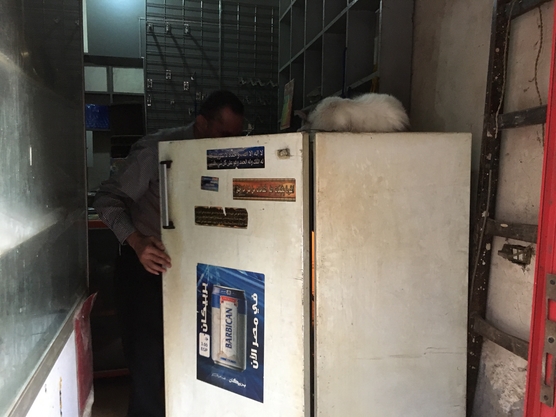
Strawberry Donuts, © Mariam Ibrahim
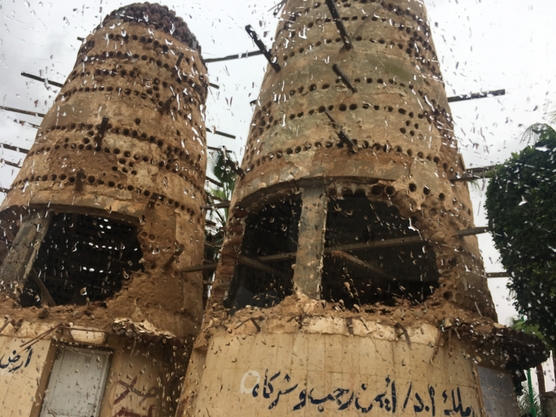
Rain in Alexandria, © Mariam Ibrahim
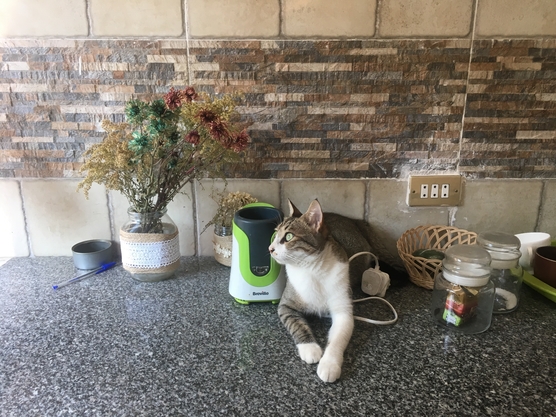
Feline life, © Mariam Ibrahim
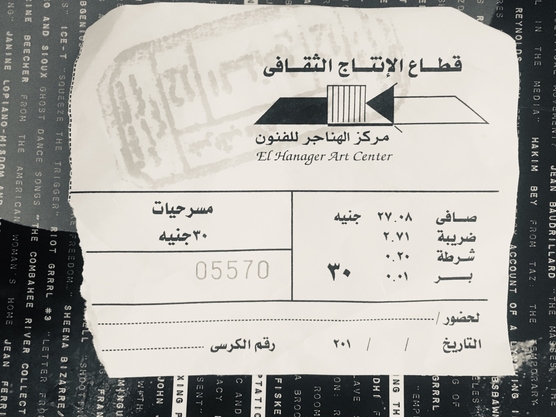
Ticket of the Hanager-Theatre, © Mariam Ibrahim
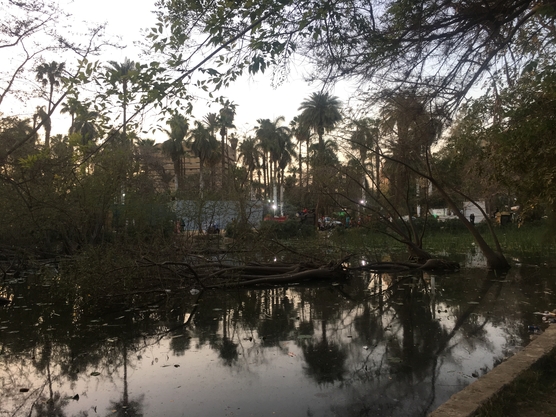
Orman Botanical Gardens, © Mariam Ibrahim
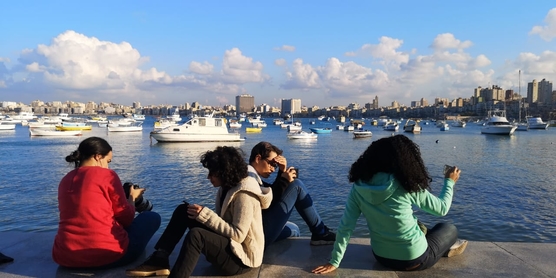
Filming on location in Alexandria, © Jocelyn Abi Gebrayel